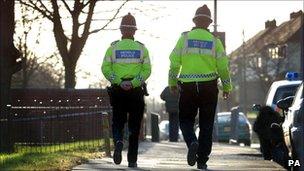Police 'plan to cut 14% of jobs by 2015'
- Published

Police numbers fell by more than 4,000 in the past year
There will be 34,000 fewer police jobs in England and Wales in March 2015 than in March 2010, research by HM Inspectorate of Constabulary suggests.
It estimated that the overall cut of 14% will include losing 16,200 officers and 16,100 civilian staff.
The HMIC added there was "relatively strong evidence" falling staff numbers might lead to a rise in some offences.
Home Office figures showed there are 139,110 officers in England and Wales - 4,625 fewer than March last year.
The annual decrease recorded by March this year was 3.2%. The number of police staff stood at 74,010, a decrease of 7% or 5,586 compared with a year earlier.
The HMIC research, external into 43 forces for the period March 2010 to March 2015 is the most authoritative study so far into the effect of the budget cuts. Its figures indicate that the impact will be far worse than expected.
Up to 1,800 community support officers will also go as part the budget cuts, the report called Adapting to Austerity says.
The inspectorate says a third of the reduction has already happened.
In a related paper,, external the HMIC looked at the relationship between police numbers and crime rates.
It said that although there was not enough expert evidence to reach firm conclusions, "what seems fair to say, however, is that there is relatively strong evidence for the potential of an effect of police numbers on crime, particularly with regard to property and other acquisitive forms of offending."
The paper, which summarised recent research in the field, cautioned against generalising. It said crime rates were affected by different complex factors.
It was not clear if criminals themselves noticed falls in police patrols, it added.
On property crime, the paper notes that existing studies estimate that a 10% reduction in officers would lead to a 3% rise in offending.
The BBC's home editor Mark Easton said police numbers in England and Wales last year were at a historic high, and even after the cuts would be "far higher" than in the post-War era when many people assume "there were a lot of policemen about".
Even with fewer officers, an "intelligent, targeted" approach could have an impact on fighting crime, our correspondent added.
'Impossible position'
Labour leader Ed Miliband said he was "shocked" by the HMIC figures and said they were an illustration of flaws in the government's strategy of eliminating the deficit.
Shadow home secretary Yvette Cooper said: "Cutting 16,200 police officers, including 2,500 front-line officers by next year alone, is an irresponsible gamble with crime and public safety."
Vernon Coaker, Shadow Minister for Police: "The cuts being imposed on the police forces of this country are simply too large"
"[Home Secretary] Theresa May has put chief constables up and down the country in an impossible position."
The Home Office has repeatedly stressed that the police front line would be protected.
Deputy Prime Minister Nick Clegg admitted the cuts would be "incredibly difficult" but said every effort would be made to try to reduce their impact.
"[The report] makes it very clear there are a whole load of things you can do in terms of savings on bureaucracy, on backroom functions, to make sure you keep as many police officers out on the streets where people want to see them".
James Brokenshire, minister for crime and security, agreed it was a "challenging" time, but said the figures did not give the whole picture.
"My focus is on visibility and availability - how the police are deployed, how they are used. Simply focusing on the figures doesn't give you that analysis."
Paul McKeever, Chairman of the Police Federation of England and Wales, said the report "confirms our worst fears" and urged the government to set up a Royal Commission on Policing to examine its future role.
"The knock-on effect will be police forces struggling to keep their heads above water as they try to deal with increasing demands and diminishing resources," he said.
"This will fundamentally change the way we police our communities, and an almost inevitable consequence will be a rise in crime rates as the population continues to increase and police numbers fall."
Chief Constable Chris Sims from the Association of Chief Police Officers said: "The whole debate on frontline policing is a red herring.
"It would be absolutely wrong to freeze the frontline and think that you could protect it and take the sort of cuts that we're talking about without it being affected."
Surrey Police is the only force intending to increase staffing by 2015, adding 200 police constables. The HMIC praised its grasp of the "financial challenges".
- Published20 July 2010
- Published2 March 2011